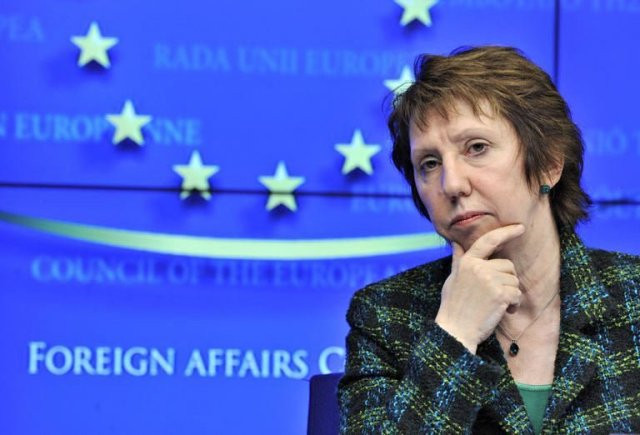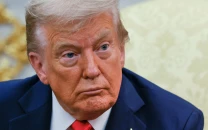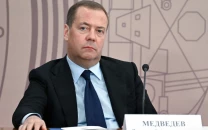EU targets Iran oil as West rounds on nuclear drive
Global powers are still waiting for Tehran to come forward and resume talks, says EU foreign policy chief Ashton.

The oil ban announced Monday, along with sanctions against Iran's central bank and other measures, came as western powers rounded on Tehran to return to negotiations amid concerns it is inching ever closer to building a nuclear bomb.
Iran denies that its nuclear programme is for military purposes and furiously denounced the unprecedented European Union measures as the United States further tightened the noose, announcing sanctions against Iran's state-owned Bank Tejarat, one of the few still accessing the international financial system.
US President Barack Obama lauded the EU move to choke Tehran's oil exports, amid evidence that sanctions are beginning to bite.
"I applaud today's actions by our partners in the European Union," Obama said.
"These sanctions demonstrate once more the unity of the international community in addressing the serious threat presented by Iran's nuclear programme.
"We will continue to increase the pressure unless Iran acts to change course and comply with its international obligations."
The Iranian currency, the rial, tumbled to a record low against the dollar on Monday, after several months of steady declines.
According to one senior Treasury official, the Iranian currency has lost more than 70 percent of its value against the dollar since autumn.
Oil prices were also up modestly Monday after the EU announced its embargo on Iran's crude exports with Brent North Sea crude for March climbing 72 cents to $110.58 a barrel in London.
Iranian foreign ministry spokesman Ramin Mehmanparast denounced "the method of threat, pressure and unfair sanctions."
The hawkish government of Iran's arch-foe Israel appeared reassured but Tehran's ally Russia warned "unilateral sanctions" could be counter-productive, preventing Iran "from making any concessions or corrections."
Piling on the pressure from Europe, the leaders of France, Germany and Britain in a move separate from the sanctions urged Iran's leaders "immediately to suspend its sensitive nuclear activities".
"Today's sanctions show how serious EU member states are about preventing nuclear proliferation and pressing Iran to return to the negotiating table," said British Foreign Secretary William Hague.
"Iran continues to defy UN resolutions and enriches uranium to 20 percent for which there is no civilian explanation," Hague added at talks with counterparts from the 27-nation bloc on the sanctions.
After weeks of fraught talks on an embargo which could hurt debt-straddled European Union nations, the ministers agreed on an immediate ban on oil imports and a gradual phase-out of existing contracts between now and July 1.
They also froze the assets of Iran's central bank "while ensuring that legitimate trade can continue under strict conditions", a statement said.
In the toughest action yet against Iran's ability to fund its nuclear programme, the EU outlawed petrochemical imports and investments and banned the sale of gold, diamonds and other precious metals.
Global powers involved in negotiations on Iran's nuclear programme are still waiting for Tehran to come forward and resume talks left in limbo since January last year, said EU foreign policy chief Catherine Ashton.
"The pressure of sanctions is designed to try and make sure that Iran takes seriously our request to come to the table," she said.
The UN's International Atomic Energy Agency confirmed Monday that a high-level visit to Iran would take place from January 29-31 for talks on Tehran's nuclear activities.
With tensions running high after Iran threatened to close the Strait of Hormuz, the US aircraft carrier USS Abraham Lincoln passed through the vital oil transit route on Sunday, joined by British and French navy ships.
The EU is Iran's second largest oil customer after China.
The potential impact on economically troubled EU nations heavily dependent on Iranian oil, Greece, Spain and Italy, as well as on the global oil market -- where oil prices rose on news of the embargo -- will be reassessed by May 1.
Greece's dependence in particular held up an accord on the embargo as the debt-hit nation relies on Iran for more than a third of its imports and had struck preferential financial terms with Tehran.
The EU has already frozen the assets of 433 firms and 113 individuals, as well as restricting trade and investment in the oil and gas industries.
The bloc imported some 600,000 barrels of Iranian oil per day in the first 10 months of last year, making it a key market alongside India and China, which has refused to bow to pressure from Washington to dry up Iran's oil revenues.
"The embargo mustn't take place solely in the EU, in the West," said German Foreign Minister Guido Westerwelle, stressing that the message to Tehran "needs an international voice."
Some 65 percent of Iranian exports go to Asia.
The bloc has been seeking new suppliers able to match the attractive conditions offered by Tehran. Contacts are under way with Saudi Arabia and hopes are high that Libya can soon increase its production.



















COMMENTS
Comments are moderated and generally will be posted if they are on-topic and not abusive.
For more information, please see our Comments FAQ